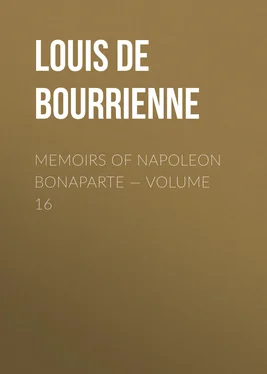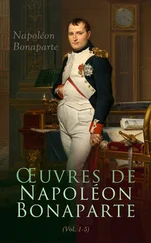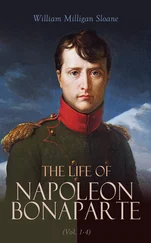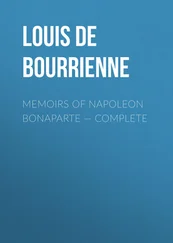Louis Bourrienne - Memoirs of Napoleon Bonaparte — Volume 16
Здесь есть возможность читать онлайн «Louis Bourrienne - Memoirs of Napoleon Bonaparte — Volume 16» — ознакомительный отрывок электронной книги совершенно бесплатно, а после прочтения отрывка купить полную версию. В некоторых случаях можно слушать аудио, скачать через торрент в формате fb2 и присутствует краткое содержание. Жанр: Биографии и Мемуары, История, foreign_edu, foreign_antique, foreign_prose, на английском языке. Описание произведения, (предисловие) а так же отзывы посетителей доступны на портале библиотеки ЛибКат.
- Название:Memoirs of Napoleon Bonaparte — Volume 16
- Автор:
- Жанр:
- Год:неизвестен
- ISBN:нет данных
- Рейтинг книги:3 / 5. Голосов: 1
-
Избранное:Добавить в избранное
- Отзывы:
-
Ваша оценка:
- 60
- 1
- 2
- 3
- 4
- 5
Memoirs of Napoleon Bonaparte — Volume 16: краткое содержание, описание и аннотация
Предлагаем к чтению аннотацию, описание, краткое содержание или предисловие (зависит от того, что написал сам автор книги «Memoirs of Napoleon Bonaparte — Volume 16»). Если вы не нашли необходимую информацию о книге — напишите в комментариях, мы постараемся отыскать её.
Memoirs of Napoleon Bonaparte — Volume 16 — читать онлайн ознакомительный отрывок
Ниже представлен текст книги, разбитый по страницам. Система сохранения места последней прочитанной страницы, позволяет с удобством читать онлайн бесплатно книгу «Memoirs of Napoleon Bonaparte — Volume 16», без необходимости каждый раз заново искать на чём Вы остановились. Поставьте закладку, и сможете в любой момент перейти на страницу, на которой закончили чтение.
Интервал:
Закладка:
Meanwhile Napoleon observed that Las Cases was busily employed, and obtained a sight of his journal, with which he was not displeased. He, however, noticed that some of the military details and anecdotes gave but a meagre idea of the subject of war: This first led to the proposal of his writing his own Memoirs. At length the Emperor came to a determination, and on Saturday, the 9th of September he called his secretary into his cabin and dictated to him some particulars of the siege of Toulon. On approaching the line they fell in with the trade- winds, that blow here constantly from the east. On the 16th there was a considerable fall of rain, to the great joy of the sailors, who were in want of water. The rain began to fall heavily just as the Emperor had got upon deck to take his afternoon walk. But this did not disappoint him of his usual exercise; he merely called for his famous gray greatcoat, which the crew regarded with much interest.
On the 23d of September they passed the line. This was a day of great merriment and disorder among the crew: it was the ceremony which the English sailors call the "christening." No one is spared; and the officers are generally more roughly handled than any one else. The Admiral, who had previously amused himself by giving an alarming description of this ceremony, now very courteously exempted his guests from the inconvenience and ridicule attending it. Napoleon was scrupulously respected through the whole of this Saturnalian festivity. On being informed of the decorum which had been observed with regard to him he ordered a hundred Napoleons to be presented to the grotesque- Neptune and his crew; which the Admiral opposed, perhaps from motives of prudence as well as politeness.
Owing to the haste with which they had left England the painting of the ship had been only lately finished, and this circumstance confined Napoleon, whose sense of smell was very acute, to his room for two days. They were now, in the beginning of October, driven into the Gulf of Guinea, where they met a French vessel bound for the Isle of Bourbon. They spoke with the captain, who expressed his surprise and regret when he learnt that Napoleon was on board. The wind was unfavourable, and the ship made little progress. The sailors grumbled at the Admiral, who had gone out of the usual course. At length they approached the termination of their voyage. On the 14th of October the Admiral had informed them that he expected to come within sight of St. Helena that day. They had scarcely risen from table when their ears were saluted with the cry of "land!" This was within a quarter of an hour of the time that had been fixed on. The Emperor went on the forecastle to see the island; but it was still hardly distinguishable. At daybreak next morning they had a tolerably clear view of it.
At length, about seventy days after his departure from England, and a hundred and ten after quitting Paris, Napoleon reached St. Helena. In the harbour were several vessels of the squadron which had separated from them, and which they thought they had left behind. Napoleon, contrary to custom, dressed early and went upon deck: he went forward to the gangway to view the island. He beheld a kind of village surrounded by numerous barren hills towering to the clouds. Every platform, every aperture, the brow of every hill was planted with cannon. The Emperor viewed the prospect through his glass. His countenance underwent no change. He soon left the deck; and sending for Las Cases, proceeded to his day's work. The Admiral, who had gone ashore very early, returned about six much fatigued. He had been walking over various parts of the island, and at length thought he had found a habitation that would suit his captives. The place stood in need of repairs, which might occupy two months. His orders were not to let the French quit the vessel till a house should be prepared to receive them. He, however, undertook, on his own responsibility, to set them on shore the next day.
On the 16th, after dinner, Napoleon, accompanied by the Admiral and the Grand-Marshal, Bertrand, got into a boat to go ashore. As he passed, the officers assembled on the quarter-deck, and the greater part of the crew on the gangways. The Emperor, before he stepped into the boat, sent for the captain of the vessel, and took leave of him, desiring him at the same time to convey his thanks to the officers and crew. These words appeared to produce the liveliest sensation in all by whom they were understood, or to whom they were interpreted. The remainder of his suite landed about eight. They found the Emperor in the apartments which had been assigned to him, a few minutes after he went upstairs to his chamber. He was lodged in a sort of inn in James Town, which consists only, of one short street, or row of houses built in a narrow valley between two rocky hills.
The next day the Emperor, the Grand-Marshal, and the Admiral, riding out to visit Longwood, which had been chosen for the Emperor's residence, on their return saw a small villa, with a pavilion attached to it, about two miles from the town, the residence of Mr. Balcombe; a merchant of the island. This spot pleased Napoleon, and the Admiral was of opinion that it would be better for him to remain here than to return to the town, where the sentinels at his door, with the crowds collected round it, in a manner confined him to his chamber. The pavilion was a sort of summer- house on a pyramidal eminence, about thirty or forty paces from the house, where the family were accustomed to resort in fine weather: this was hired for the temporary abode of the Emperor, and he took possession of it immediately. There was a carriage-road from the town, and the valley was in this part less rugged in its aspect. Las Cases was soon sent for. As be ascended the winding path leading to the pavilion he saw Napoleon standing at the threshold of the door. His body was slightly bent, and his hands behind his back: he wore his usual plain and simple uniform and the well-known hat. The Emperor was alone. He took a fancy to walk a little; but there was no level ground on any side of the pavilion, which was surrounded by huge pieces of rock. Taking the arm of his companion, however, he began to converse in a cheerful strain. When Napoleon was about to retire to rest the servants found that one of the windows was open close to the bed: they barricaded it as well as they could, so as to exclude the air, to the effects of which the Emperor was very susceptible. Las Cases ascended to an upper room. The valets de chambres lay stretched in their cloaks across the threshold of the door. Such was the first night Napoleon passed at the Briars.
An English officer was lodged with them in the house as their guard, and two non-commissioned officers were stationed near the house to watch their movements. Napoleon the next day proceeded with his dictation, which occupied him for several hours, and then took a walk in the garden, where he was met by the two Misses Balcombe, lively girls about fourteen years of age, who presented him with flowers, and overwhelmed him with whimsical questions. Napoleon was amused by their familiarity, to which he had been little accustomed. "We have been to a masked ball," said he, when the young ladies had taken their leave.
The next day a chicken was brought for breakfast, which the Emperor undertook to carve himself, and was surprised at his succeeding so well, it being a long time since he had done so much. The coffee he considered so bad that on tasting it he thought himself poisoned, and sent it away.
The mornings were passed in business; in the evening Napoleon sometimes strolled to the neighbouring villa, where the young ladies made him play at whist. The Campaign of Italy was nearly finished, and Las Cases proposed that the other followers of Napoleon who were lodged in the town should come up every morning to assist in transcribing The Campaign of Egypt, the History of the Consulate, etc. This suggestion pleased the ex-Emperor, so that from that time one or two of his suite came regularly every day to write to his dictation, and stayed to dinner. A tent, sent by the Colonel of the 53d Regiment, was spread out so as to form a prolongation of the pavillion. Their cook took up his abode at the Briars. The table linen was taken from the trunks, the plate was set forth, and the first dinner after these new arrangements was a sort of fete.
Читать дальшеИнтервал:
Закладка:
Похожие книги на «Memoirs of Napoleon Bonaparte — Volume 16»
Представляем Вашему вниманию похожие книги на «Memoirs of Napoleon Bonaparte — Volume 16» списком для выбора. Мы отобрали схожую по названию и смыслу литературу в надежде предоставить читателям больше вариантов отыскать новые, интересные, ещё непрочитанные произведения.
Обсуждение, отзывы о книге «Memoirs of Napoleon Bonaparte — Volume 16» и просто собственные мнения читателей. Оставьте ваши комментарии, напишите, что Вы думаете о произведении, его смысле или главных героях. Укажите что конкретно понравилось, а что нет, и почему Вы так считаете.












